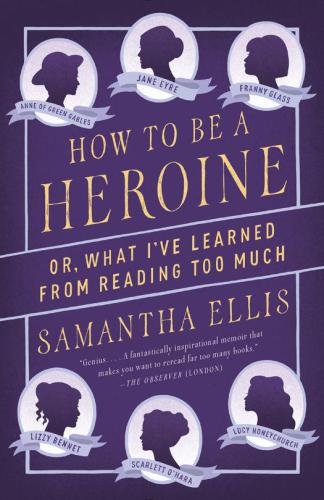
How to Be a Heroine
Or, What I've Learned from Reading Too Much
کتاب های مرتبط
- اطلاعات
- نقد و بررسی
- دیدگاه کاربران
نقد و بررسی

December 22, 2014
While growing up in London’s Iraqi-Jewish community, Ellis knew early on that she didn’t want the happy ending her parents wanted for her: “marriage to a nice Iraqi-Jewish boy.” In this charming memoir, playwright and journalist Ellis revisits and reevaluates the books that, in childhood and young adulthood, she read to figure out what kind of woman she wanted to be. Her journey begins during an argument with her best friend about which of the Brontë sisters’ heroines is best, when she realizes that, rather than Wuthering Heights’ tumultuous Cathy Earnshaw, she should have been defending rational, clear-sighted Jane Eyre. She goes on to revisit her early admiration for Anne of Green Gables, Lizzy Bennett, and Franny Glass, while also admitting that some of her heroines fall short today, whether because they are too insipid (The Little Princess) or preachy (Little Women). She’s unsparing even toward her all-time favorite novel, Wuthering Heights, finding Cathy and Heathcliff’s love “the kind... that could only be written by someone who had never been in love.” Likable and open about her own vulnerabilities as well as her characters’, Ellis concludes that “maybe it’s by appropriating our heroines that we become heroines ourselves.” Agent: Judith Murray, Greene & Heaton (U.K.).

November 1, 2014
A literary journey to self-discovery.Growing up in London in a family of Iraqi-Jewish refugees, playwright Ellis (Cling to Me Like Ivy, 2010) looked for models of courage and adventure and, she hoped, an escape from the future her parents planned for her: marriage to an Iraqi-Jewish man, children and a well-kept home. In this autobiography of reading, the author recalls the fictional characters she saw as heroines, including Anne of Green Gables; strong-willed Scarlett O'Hara; the elegant Anne Welles of Jacqueline Susann's Valley of the Dolls; and the consummate storyteller, Scheherazade. Louisa May Alcott's Jo March "was fabulously rebellious" but disappointed Ellis when she married a German professor and gave up writing to run a school. At 12, Ellis loved Jane Austen's Elizabeth Bennet "for her muddy petticoats, her irreverence and her big heart. But mostly I loved her defiance of convention." Until she switched her allegiance to brave, clever Jane Eyre, passionate Cathy Earnshaw, of Wuthering Heights, was the heroine she wanted most to emulate. "Back then," Ellis writes, "I wanted my heroines to show me new ways to be, like heedless, selfish Cathy." As a college student, she found a kindred spirit in Sylvia Plath and her protagonist, Esther Greenwood, of The Bell Jar. Dressing in black, wearing heavy eyeliner, Ellis decided to go to Cambridge, "where Plath's poetry took off, and where she met Ted Hughes." From Lucy Honeychurch, in E.M. Forster's A Room with a View, she got "the idea of becoming an artist and living an artist's life. It was because of her that I started writing plays." Her first was inspired by Edward Albee's Who's Afraid of Virginia Woolf, in which she identified with the angry Martha. As Ellis shows in this charming, gracefully written memoir, literary heroines revealed to her new life stories, new selves and her own power to invent her life.
COPYRIGHT(2014) Kirkus Reviews, ALL RIGHTS RESERVED.

Starred review from February 1, 2015
Like Rebecca Mead in My Life in Middlemarch, London playwright Ellis bridges memoir and literary criticism as she traces her literary past to uncover the female characters who have most influenced and changed her life. In Lucy Maud Montgomery's Anne of Green Gables and Charlotte Bronte's Jane Eyre and in even more unexpected places, Sylvia Plath's The Bell Jar and Jacqueline Susann's Valley of the Dolls, the author finds models of strength and adventuresome spirit. Born to Iraqi-Jewish refugees, Ellis grew up in a small, self-contained, Judeo-Arabic community in London where she learned to balance her conservative religious upbringing with her wanderlust--her longing for new places and for new ideas. The heroines here give her courage through this and other life challenges, including an undiagnosable illness and a few failed romances. VERDICT Ellis writes compellingly, and her descriptions are apt to make readers nostalgic for their own heroines and wistful for the ones that they may have missed. Fortunately, the book includes a bibliography (which ought to be distributed to women, especially young women, everywhere). The materials listed will provide some comfort to readers once they finish this irresistible story.--Meagan Lacy, Guttman Community Coll., CUNY
Copyright 2015 Library Journal, LLC Used with permission.

Starred review from November 1, 2014
Jo March. Lizzy Bennet. Scarlett O'Hara. Marjorie Morningstar. These women and many more figures from literature have shaped Ellis' approach to life since she was young. In this winning memoir, she revisits favorite literary characters from her reading life, describing what they meant to her when she first met them and examining how well they hold up on further review. This is a book for book lovers, who will likely come away with a fresh take on old favorites from Ellis' endearing but exacting examinations. Although Ellis' own story of growing up in an Iraqi-Jewish community in London and becoming a playwright is specific, her enduring love for her literary role models is universal. The book could equally be titled How to Be a Reader; Ellis is passionate and engaged, railing against writers who shortchange their creations and celebrating those whose characters represent their best selves. She is frank about times she has misread works, and she employs a rigorous feminist lens. Primarily, though, this is a rousing call for women to be the heroines in their own lives, and it's good fun, to boot.(Reprinted with permission of Booklist, copyright 2014, American Library Association.)

























دیدگاه کاربران